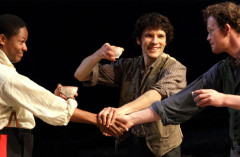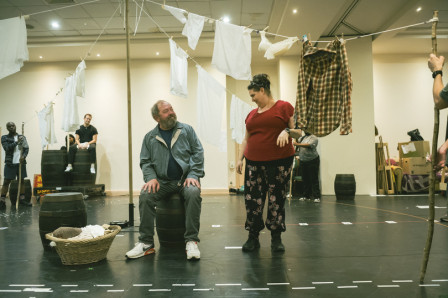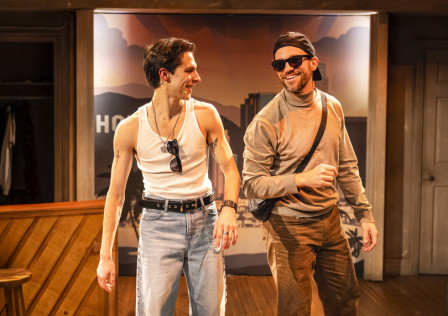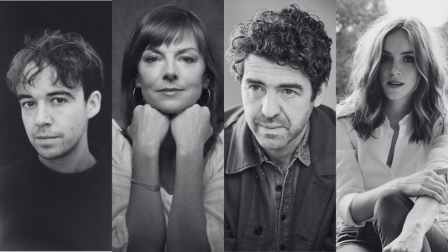Review: TRANSLATIONS in the Olivier at the National Theatre
 The wide expanses of the Olivier Theatre are filled with a sloping Irish bog above which fog hangs evocatively. Marooned in the midst of this is an area representing a hedge school, the type of ad hoc improvised location where poor and rural Irish received a rudimentary education in the 18th and 19th Century.
The wide expanses of the Olivier Theatre are filled with a sloping Irish bog above which fog hangs evocatively. Marooned in the midst of this is an area representing a hedge school, the type of ad hoc improvised location where poor and rural Irish received a rudimentary education in the 18th and 19th Century.
There's a lengthy scene establishing a little group of misfits and eccentrics revelling in the joy of learning Greek and Latin. A language they don't study is English so that when a group of British soldiers arrive most of the native Irish speakers are unable to communicate with them beyond a few words. The invaders of course never bother to learn the new vocabulary.
To begin with our army's intentions in Ireland are relatively benign. We're there to make an accurate map, record the culture and reflect original place names in a standardised spelling. But of course where there's no common language there's room for misunderstanding and relations between the opposing forces deteriorate and darken with the weather and the lighting design.
Ciaran Hinds seems to be auditioning for the role of King Lear as he roars powerfully around the stage as the grizzled teacher, slowly loosing his grip on his own destiny. Colin Morgan (TVs Merlin) is new to me and adorable as a local lad who acts as an increasingly disillusioned interpreter, and Seamus O'Hara is the troubled school master who finds himself on the wrong side of the authorities and losing his girl to a glamorous English officer - Adetomiwa Edun.
The famous love scene in which this newcomer and local lass (Michelle Fox) can't make them selves understood is one of the more lighthearted metaphors. But there's plenty more, landing thick and fast - like the local girl with vocal problems who finds her voice and blossoms in the early scenes of friendship, only to loose it again as the Brits become more fascistic.
Packed with latin jokes and liberal philosophy, intellectual theatre goers have always loved this play and how clever and self-righteous it makes them feel with its cosy depiction of martyred Irish peasantry.
And what a classy, visually splendid production of it this is. There's even fiddle music to help you understand the emotions when the roaring in thick drunken accents, peppered with indecipherable Latin becomes impenetrable; and the lighting and sound design is exquisite. Although no one plays the penny whistle.
The very air exudes worthy, quality theatre with cast and creatives straining every muscle to deliver an evening that's wholesome and good for you.
If only it wasn't so dull.
Latest News

 The Unlikely Pilgrimage of Harold Fry at Theatre Royal Haymarket - Rehearsal images released
16 January 2026 at 15:41
The Unlikely Pilgrimage of Harold Fry at Theatre Royal Haymarket - Rehearsal images released
16 January 2026 at 15:41

 Already Perfect at King's Head Theatre review
16 January 2026 at 10:25
Already Perfect at King's Head Theatre review
16 January 2026 at 10:25

 Cast announced for Summerfolk at National Theatre
16 January 2026 at 10:03
Cast announced for Summerfolk at National Theatre
16 January 2026 at 10:03

 Matt Cardle to star in West End production of Kinky Boots at the London Coliseum
16 January 2026 at 10:02
Matt Cardle to star in West End production of Kinky Boots at the London Coliseum
16 January 2026 at 10:02
